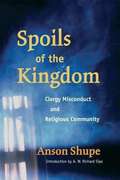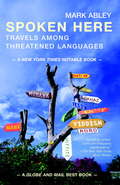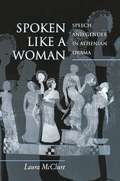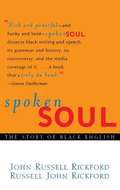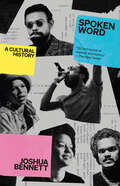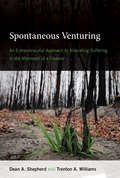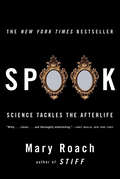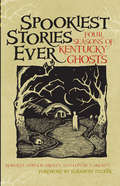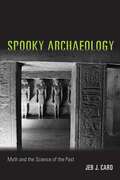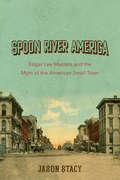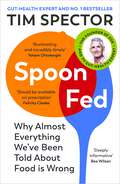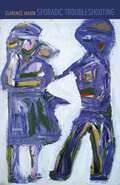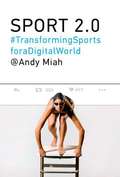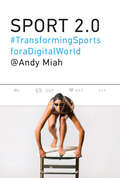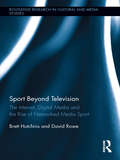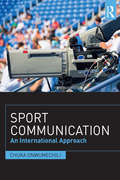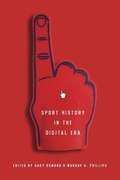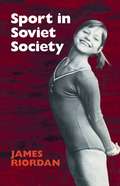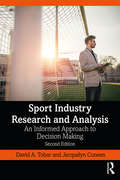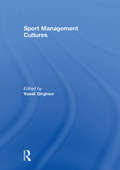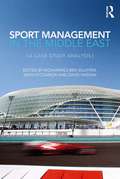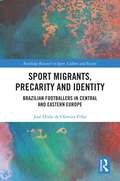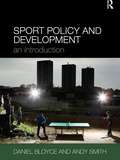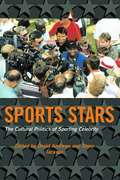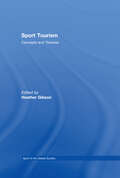- Table View
- List View
Spoils of the Kingdom: Clergy Misconduct and Religious Community
by Anson Shupe A. W. SipeIn Spoils of the Kingdom, Anson Shupe investigates clergy misconduct as it has recently unfolded across five faith-based groups. Looking at episodes of abuse in the Roman Catholic, Mormon, African American Protestant, white Evangelical Protestant, and First Nations communities, Spoils of the Kingdom tackles hard questions not only about the sexual abuse of women and children, but also about economic frauds perpetrated by church leaders (including embezzlement, mis-represented missions, and outright theft) as well as cases of excessively authoritarian control of members' health, lifestyles, employment, and politics. Drawing on case evidence, Shupe employs classical and modern social exchange theories to explain the institutional dynamics of clergy misconduct. He argues that there is an implicit contract of reciprocity and compliance between congregants and religious leaders that, when amplified by the charismatic awe often associated with religious authorities, can lead to misconduct.
Spoken Here
by Mark AbleyWhether on the other side of the world or in our own backyard, languages everywhere are fading into oblivion. Mark Abley explores what the human family stands to lose -- and explains why some endangered languages continue to thrive.Within the next couple of generations, most of the world's 6000 languages will vanish, due mainly to the unstoppable tide of English. With an open mind and a well-worn passport, award-winning journalist and poet Mark Abley tells entertaining and vital stories about why languages matter. From Oklahoma to Provence, aboriginal Australia to Baffin Island, the cultures are radically different, but the problems of shrinking linguistic and cultural richness are painfully similar. Abley's investigation provides a stunning glimpse of the beauty and intricacies of languages like Yiddish and Yuchi, Mohawk and Manx, Inuktitut and Provençal. More importantly, it offers a sympathetic and memorable portrait of the people who still speak languages under threat.When a language dies out, gone too are stories that have been told for centuries, unique ways of seeing the world, and perhaps even ways of solving problems both large and small. Abley believes we must see languages as abundant sources of richness, wonder and usefulness. And he shows that hope still exists: that the determination of even one person can revive a whole language and its culture, in the process creating something new, changing and alive -- exactly what languages do best.From the Trade Paperback edition.
Spoken Like a Woman: Speech and Gender in Athenian Drama
by Laura McClureIn ancient Athens, where freedom of speech derived from the power of male citizenship, women's voices were seldom heard in public. Female speech was more often represented in theatrical productions through women characters written and enacted by men. In Spoken Like a Woman, the first book-length study of women's speech in classical drama, Laura McClure explores the discursive practices attributed to women of fifth-century b.c. Greece and to what extent these representations reflected a larger reality. Examining tragedies and comedies by a variety of authors, she illustrates how the dramatic poets exploited speech conventions among both women and men to construct characters and to convey urgent social and political issues.From gossip to seductive persuasion, women's verbal strategies in the theater potentially subverted social and political hierarchy, McClure argues, whether the women characters were overtly or covertly duplicitous, in pursuit of adultery, or imitating male orators. Such characterization helped justify the regulation of women's speech in the democratic polis. The fact that women's verbal strategies were also used to portray male transvestites and manipulators, however, suggests that a greater threat of subversion lay among the spectators' own ranks, among men of uncertain birth and unscrupulous intent, such as demagogues skilled in the art of persuasion. Traditionally viewed as outsiders with ambiguous loyalties, deceitful and tireless in their pursuit of eros, women provided the dramatic poets with a vehicle for illustrating the dangerous consequences of political power placed in the wrong hands.
Spoken Soul: The Story of Black English
by John Russell Rickford Russell John Rickford"Spoken Soul brilliantly fills a huge gap... a delightfully readable introduction to the elegant interweave between the language and its culture."-Ralph W. Fasold, Georgetown University. "A lively, well-documented history of Black English... that will enlighten and inform not only educators, for whom it should be required reading, but all who value and question language." -Kirkus Reviews. "Spoken Soul is a must read for anyone who is interested in the connection between language and identity." -Chicago Defender Claude Brown called Black English "Spoken Soul." Toni Morrison said, "It's a love, a passion. Its function is like a preacher's: to make you stand out of your seat, make you lose yourself and hear yourself. The worst of all possible things that could happen would be to lose that language." Now renowned linguist John R. Rickford and journalist Russell J. Rickford provide the definitive guide to African American vernacular English from its origins and features to its powerful fascination for society at large.
Spoken Word: A Cultural History
by Joshua BennettA NEW YORK TIMES NOTABLE BOOK OF THE YEAR • A &“rich hybrid of memoir and history&” (The New Yorker) of the literary art form that has transformed the cultural landscape, by one of its influential practitioners, an award-winning poet, professor, and slam champion&“Bennett…transport[s] us back to the city blocks, bars, cafes and stages these artists traversed and inhabited…an instructive text for young poets, artists or creative entrepreneurs trying to find a way to carve out a space for themselves…Shines with a refreshing dynamism.&” —The New York TimesIn 2009, when he was twenty years old, Joshua Bennett was invited to perform a spoken word poem for Barack and Michelle Obama, at the same White House "Poetry Jam" where Lin-Manuel Miranda declaimed the opening bars of a work-in-progress that would soon revolutionize American theater. That meeting is but one among many in the trajectory of Bennett's young life, as he rode the cresting wave of spoken word through the 2010s. In this book, he goes back to its roots, considering the Black Arts movement and the prominence of poetry and song in Black education; the origins of the famed Nuyorican Poets Cafe in the Lower East Side living room of the visionary Miguel Algarín, who hosted verse gatherings with legendary figures like Ntozake Shange and Miguel Piñero; the rapid growth of the "slam" format that was pioneered at the Get Me High Lounge in Chicago; the perfect storm of spoken word's rise during the explosion of social media; and Bennett's own journey alongside his older sister, whose work to promote the form helped shape spaces online and elsewhere dedicated to literature and the pursuit of human freedom. A celebration of voices outside the dominant cultural narrative, who boldly embraced an array of styles and forms and redefined what—and whom—the mainstream would include, Bennett's book illuminates the profound influence spoken word has had everywhere melodious words are heard, from Broadway to academia, from the podiums of political protest to cafés, schools, and rooms full of strangers all across the world.
Spontaneous Venturing: An Entrepreneurial Approach to Alleviating Suffering in the Aftermath of a Disaster (The\mit Press Ser.)
by Dean A. Shepherd Trenton A. WilliamsIdentifying a new approach to disaster response: spontaneous, compassionate, and impromptu actions to alleviate suffering.In Spontaneous Venturing, Dean Shepherd and Trenton Williams identify and describe a new approach for responding to disaster and suffering: the local organizing of spontaneous, compassionate, and impromptu actions—the rapid emergence of a compassionate venture. This approach, termed by the authors “spontaneous venturing,” can be more effective than the traditional “command-and-control” methods of large disaster relief organizations. It can customize and target resources and deliver them quickly, helping victims almost immediately. For example, during the catastrophic 2009 bushfires in Victoria, Australia—the focal disaster for the book—residents organized an impromptu relief center that collected and distributed urgently needed goods without red tape. Special bonds and friendships formed among the volunteers and victims; some were both volunteer and victim. Many victims were able to mobilize resources despite considerable personal losses.Shepherd and Williams describe the lasting impact of disaster and tell the stories of Victoria residents who organized in the aftermath of the bushfires. They consider the limitations of traditional disaster relief efforts and explain that when victims take action to help others, they develop behavioral, emotional, and assumptive resilience; venturing leads to social interaction, community connections, and other positive outcomes. Finally, they explore spontaneous venturing in a less-developed country, investigating the activities of Haitians after the devastating 2010 earthquake. The lesson for communities hit by disaster: find opportunities for compassionate action.
Spook: Science Tackles the Afterlife
by Mary RoachThe best-selling author of Stiff and Bonk trains her considerable wit and curiosity on the human soul. "What happens when we die? Does the light just go out and that's that—the million-year nap? Or will some part of my personality, my me-ness persist? What will that feel like? What will I do all day? Is there a place to plug in my lap-top?" In an attempt to find out, Mary Roach brings her tireless curiosity to bear on an array of contemporary and historical soul-searchers: scientists, schemers, engineers, mediums, all trying to prove (or disprove) that life goes on after we die.
Spookiest Stories Ever: Four Seasons of Kentucky Ghosts
by Roberta Simpson Brown Lonnie E. BrownA collection of haunting tales set among the landscapes and landmarks of the Bluegrass State.Tree branches scratching at your window on a stormy April night . . . The hot, sticky oppression of a stifling summer&’s day . . . November leaves rustling as a chill sneaks into your bones . . . The darkened days of winter . . . No matter what the season, it&’s always a good time for a ghost story.From masterful storytelling duo Roberta and Lonnie Brown comes Spookiest Stories Ever: Four Seasons of Kentucky Ghosts, a creepy collection of tales from their home state. Featuring familiar Kentucky landmarks such as the Palace Theater and the Waverly Hills Sanatorium in Louisville and Shaker Village of Pleasant Hill, these accounts from across the commonwealth are sure to put a tingle in the reader&’s spine.These notable stories, including tales of the &“chime child&” who can see and talk to ghosts, graveside appearances, and the Spurlington Witch of Taylor County, occur in all four seasons and come from every corner of Kentucky. An essential part of the American storytelling tradition, these ghost stories will delight those who love getting goose bumps all year long.
Spooky Archaeology: Myth and the Science of the Past
by Jeb J. CardOutside of scientific journals, archaeologists are depicted as searching for lost cities and mystical artifacts in news reports, television, video games, and movies like Indiana Jones or The Mummy. This fantastical image has little to do with day-to-day science, yet it is deeply connected to why people are fascinated by the ancient past. By exploring the development of archaeology, this book helps us understand what archaeology is and why it matters.In Spooky Archaeology author Jeb J. Card follows a trail of clues left by adventurers and professional archaeologists that guides the reader through haunted museums, mysterious hieroglyphic inscriptions, fragments of a lost continent that never existed, and deep into an investigation of magic and murder. Card unveils how and why archaeology continues to mystify and why there is an ongoing fascination with exotic artifacts and eerie practices.
Spoon River America: Edgar Lee Masters and the Myth of the American Small Town
by Jason StacyFrom Main Street to Stranger Things, how poetry changed our idea of small town life A literary and cultural milestone, Spoon River Anthology captured an idea of the rural Midwest that became a bedrock myth of life in small-town America. Jason Stacy places the book within the atmosphere of its time and follows its progress as the poetry took root and thrived. Published by Edgar Lee Masters in 1915, Spoon River Anthology won praise from modernists while becoming an ongoing touchstone for American popular culture. Stacy charts the ways readers embraced, debated, and reshaped Masters's work in literary controversies and culture war skirmishes; in films and other media that over time saw the small town as idyllic then conflicted then surreal; and as the source of three archetypes—populist, elite, and exile—that endure across the landscape of American culture in the twenty-first century. A wide-ranging reconsideration of a literary landmark, Spoon River America tells the story of how a Midwesterner's poetry helped change a nation's conception of itself.
Spoon-Fed: Why almost everything we’ve been told about food is wrong, by the #1 bestselling author of Food for Life
by Tim SpectorTHE #1 SUNDAY TIMES BESTSELLER FROM THE LEADING GUT-HEALTH EXPERT, FOUNDER OF ZOE AND AUTHOR OF FOOD FOR LIFE* As seen on ITV's LORRAINE and heard on THE DIARY OF A CEO *This ground-breaking exploration debunks food myths, from what we should be eating for breakfast to whether we should really avoid ultra-processed foods.Is breakfast really the most important meal of the day?Is there any point in counting calories?Is there any evidence that coffee is bad for us?Through his pioneering research, Professor Tim Spector busts these and many other myths about food.Spoon-Fed explores the scandalous lack of good science behind many diet plans, official recommendations, miracle cures and ultra-processed foods, and encourages us to rethink our whole relationship with food - not just for our health as individuals, but for the future of the planet.'Hugely enjoyable' Michael Mosley'Illuminating and so incredibly timely' Yotam Ottolenghi'This book should be available on prescription' Felicity Cloake'Will actually help you decide what to add to your next grocery shop' Bee Wilson, GuardianGo with your gut. Join the food revolution.**Tim Spector's number 1 bestselling Food for Life: Your Guide to the New Science of Eating Well is now available in paperback****PRE-ORDER THE FOOD FOR LIFE COOKBOOK, COMING OCTOBER 2024, NOW**
Sporadic Troubleshooting: Poems
by Clarence MajorDeeply felt and brimming with humor and philosophical inquiry, Sporadic Troubleshooting, the latest volume from Clarence Major, both acknowledges poetic literary tradition and explores exciting new territories in language. Throughout, Major uses an improvisational technique, applying it to well-known mythological stories to enhance narrative and lyrical intensity. Breathtakingly vivid, these poems are testaments to universal subjects such as love, charity, nature, fear, survival, loyalty, justice, and beauty. Major’s poems offer vigorous inquiries into life and art with a view toward renewal and transformation.
Sport 2.0: Transforming Sports for a Digital World
by Andy MiahDigital technology is changing everything about modern sports. Athletes and coaches rely on digital data to monitor and enhance performance. Officials use tracking systems to augment their judgment in what is an increasingly superhuman field of play. Spectators tune in to live sports through social media, or even through virtual reality. Audiences now act as citizen journalists whose collective shared data expands the places in which we consume sports news. In Sport 2.0, Andy Miah examines the convergence of sports and digital cultures, examining not only how it affects our participation in sport but also how it changes our experience of life online. This convegence redefines how we think of about our bodies, the social function of sports, and the kinds of people who are playing. Miah describes a world in which the rise of competitive computer game playing -- e-sports -- challenges and invigorates the social mandate. Miah also looks at the Olympic Games as an exemplar of digital innovation in sports, and offers a detailed look at the social media footprint of the 2012 London Games, discussing how organizers, sponsors, media, and activists responded to the world's largest media event. In the end, Miah does not argue that physical activity will cease to be central to sports, or that digital corporeality will replace the nondigital version. Rather, he provides a road map for how sports will become mixed-reality experiences and abandon the duality of physical and digital.
Sport 2.0: Transforming Sports for a Digital World (The\mit Press Ser.)
by Andy MiahRamifications of the convergence of sports and digital technology, from athlete and spectator experience to the role of media innovation at the Olympics.Digital technology is changing everything about modern sports. Athletes and coaches rely on digital data to monitor and enhance performance. Officials use tracking systems to augment their judgment in what is an increasingly superhuman field of play. Spectators tune in to live sports through social media, or even through virtual reality. Audiences now act as citizen journalists whose collective shared data expands the places in which we consume sports news. In Sport 2.0, Andy Miah examines the convergence of sports and digital cultures, examining not only how it affects our participation in sport but also how it changes our experience of life online. This convergence redefines how we think of about our bodies, the social function of sports, and the kinds of people who are playing. Miah describes a world in which the rise of competitive computer game playing—e-sports—challenges and invigorates the social mandate. Miah also looks at the Olympic Games as an exemplar of digital innovation in sports, and offers a detailed look at the social media footprint of the 2012 London Games, discussing how organizers, sponsors, media, and activists responded to the world's largest media event.In the end, Miah does not argue that physical activity will cease to be central to sports, or that digital corporeality will replace the nondigital version. Rather, he provides a road map for how sports will become mixed-reality experiences and abandon the duality of physical and digital.
Sport Beyond Television: The Internet, Digital Media and the Rise of Networked Media Sport (Routledge Research in Cultural and Media Studies)
by David Rowe Brett HutchinsTelevision is no longer the only screen delivering footage and news to people about sport. Computers, the Internet, Web, mobile and other digital media are increasingly important technologies in the production and consumption of sports media. Sport Beyond Television analyzes the changes that have given rise to this situation, combining theoretical insights with original evidence collected through extensive research and interviews with people working in the media and sport industries. It locates sports media as a pivotal component in online content economies and cultures, and counteracts the scant scholarly attention to sports media when compared to music, film and publishing in convergent media cultures. An expanding array of popular sports media – industry, user, club, athlete and fan produced – is now available and accessible in networked digital communications environments. This change is confounding the thinking of major sports organizations that have lived off the generous revenue flowing from exclusive broadcast contracts with free-to-air and subscription television networks for the last five decades. These developments are creating commercial and policy confusion, particularly as sports audiences and the advertising market fragment in line with the proliferation of niche channels and sources of digital sports media. Chapters in this title examine the shift from broadcast to online sports media markets, the impact of social networking platforms like Twitter and Facebook, evolving user and fan practices, the changing character of sports journalism, and the rise of sports computer gaming. Each chapter traces the socio-cultural implications of trends and trajectories in media sport.
Sport Communication: An International Approach
by Chuka OnwumechiliSport is a global business. Now more than ever, sport communication professionals need to understand sport’s global reach in order to develop their full potential. This is the first textbook to introduce the fundamental principles and practice of sport communication from an international perspective. Combining business strategies with insights into social issues such as gender, disability and national identity, this is an accessible, practical and engaging guide to the essentials of sport communication. Aimed to enhance learning at both undergraduate and postgraduate levels, each chapter contains special features tailored to meet the needs of students and instructors. These include learning objectives, chapter summaries, activities, reflections, discussion questions, recommended resource lists and original cross-cultural case studies that demonstrate sport communication theories put into practice. Its twenty chapters explore communication in sport across all levels, from interpersonal communication and team building to strategic communications, and in all forms of media, from print and broadcast to social media. Sport Communication: An International Approach is an essential text for any course on sport communication, sport business or sport management.
Sport History in the Digital Era
by Murray G Phillips Gary OsmondFrom statistical databases to story archives, from fan sites to the real-time reactions of Twitter-empowered athletes, the digital communication revolution has changed the way fans relate to LeBron's latest triple double or Tom Brady's last second touchdown pass. In this volume, contributors from Australia, Ireland, New Zealand, the United Kingdom, and the United States analyze the parallel transformation in the field of sport history, showing the ways powerful digital tools raise vital philosophical, epistemological, ontological, methodological, and ethical questions for scholars and students alike. Chapters consider how philosophical and theoretical understandings of the meaning of history influence engagement with digital history, and conceptualize the relationship between history making and the digital era. As the writers show, digital media's mostly untapped potential for studying the recent past via media like blogs, chat rooms, and gambling sites forge a symbiosis between sports and the internet while offering historians new vistas to explore and utilize. In this new era, digital history becomes a dynamic site of enquiry and discussion where scholars enter into a give-and-take with individuals and invite their audience to grapple with, rather than passively absorb, evidence. Timely and provocative, Sport History in the Digital Era affirms how the information revolution has transformed sport and sport history--and shows the road ahead. Contributors include Douglas Booth, Mike Cronin, Martin Johnes, Matthew Klugman, Geoffery Z. Kohe, Tara Magdalinski, Fiona McLachlan, Bob Nicholson, Rebecca Olive, Gary Osmond, Murray G. Phillips, Stephen Robertson, Synthia Sydnor, Holly Thorpe, and Wayne Wilson.
Sport In Soviet Society: Development of Sport and Physical Education in Russia and the Ussr (Soviet and East European Studies #22)
by James RiordanThe basic material for this book was gathered in different parts of the Soviet Union from i960 to 1975, eventually materialising as a PhD thesis for the University of Birmingham. My thanks are due particularly to my former colleagues and team mates at Progress Publishers, Moscow, Yuri Sdobnikov and Len Stoklitsky, for firing my enthusiasm yet harnessing my energy; they are, of course, not a whit responsible for any of the views I express.
Sport Industry Research and Analysis: An Informed Approach to Decision Making
by Jacquelyn Cuneen David A. TobarSport Industry Research and Analysis offers a straightforward, no nonsense approach to research design and statistical analyses in sport organizations. This fully revised and updated new edition describes the research process, from identifying a research question to analyzing data, and uses real world scenarios to help students and industry professionals understand how to conduct research and apply the results in their wider work. The book includes clear, step-by-step instructions for the analysis and interpretation of data. It explains how to use Excel and SPSS for every key statistic and statistical technique, with screenshots illustrating every step and additional scenarios providing further context. "In Practice" contributions from sport industry professionals demonstrate how these practitioners use statistical analyses in their everyday tasks, and this new edition includes expanded sections on conducting a literature review and research ethics, as well as ancillary materials for instructors including slides, test questions, data files, answer sheets, and videos. This is the clearest and most easy-to-use guide to research and analysis techniques in sport, helping the reader to build essential skills and confidence in using statistics, vital to support decision-making in any sport enterprise. It is an essential text for any sport business research methods course, and an invaluable reference for all sport industry professionals.
Sport Management Cultures
by Vassil GirginovThis is the first book to address the link between culture and sport management. The aim is to demonstrate that culture profoundly affects how we research, teach and practice sport management. The book engages with the concept of culture both as an abstract analytical category and specific beliefs and practices. It recognizes that a single best way of managing does not exist; that the applicability of management theories may stop at national boundaries; and that fundamental cultural values act as a strong determinant to managerial ideology and practice. Culture makes the study of sport management interesting because it challenges many taken-for-granted assumptions about management, yet it reinforces our belief in the existence of common management problems. The book offers a comprehensive review of the conceptualisations of culture and its relation with sport management by examining a range of issues: the emergence of multiculturalism as a policy issue; the impact of commonly shared cultural values within the fitness industry on managers and organisations behaviour; building cultural bridges in community sport organisations; cultural meanings attached to the consumption of Olympic merchandise, and culturally-informed interpretation through a reflective analysis of sport management texts. This book was published as a special issue of European Sport Management Quarterly.
Sport Management in the Middle East: A Case Study Analysis
by Sean O'Connor David Hassan Mohammed Ben SulayemThe Middle East is one of the fastest growing and significant markets in world sport, as well as a powerful source of investment in sport. Bids for the Olympics in 2020 and the soccer World Cup in 2022, as well as remarkable investments in Formula One motor racing, horse racing and English Premier League soccer clubs, demonstrate the strength of interest, the depth of resource and the technical expertise maintained by sport business interests in the region. Sport Management in the Middle East is the first book to offer a serious and in-depth analysis of the business and management of sport in the region. Written by a team of world leading researchers in Middle Eastern sport, and illustrated in full colour throughout, the book examines the importance of sport in the Middle East and introduces its particular management processes, structures and cultures. As well as providing an overview of the region’s sporting strategy and key stakeholders, the book also offers a number of detailed case-studies of sport in individual Middle Eastern countries. A unique guide to sport management in a region of fundamental importance in world sport, this book is essential reading for any serious student or scholar of sport management, sport business, Middle East studies, or sport and society.
Sport Migrants, Precarity and Identity: Brazilian Footballers in Central and Eastern Europe (Routledge Research in Sport, Culture and Society)
by José Hildo de Oliveira FilhoThis book takes a close look at the experiences of migrant athletes, their precarious careers, and at what this can tell us about wider themes of globalisation, identity, race, gender, and the body.Based on in-depth ethnographic research on male Brazilian footballers and futsal players working in Central and Eastern Europe, this book helps to fill gaps in previous research on sports migration and global sports labor markets. This book uses life-history interviews to reveal how race, gender, and class are articulated in the everyday experiences of migrant athletes; how they express their religious affiliations; and how they navigate the relationships with injuries and pain that are characteristic of precarious athletic careers. This book considers the transnational networks that are essential in sustaining international athletic labor flows and the role that borders and emotions play in the lives of sports migrants and also the agency that migrant athletes can have in issues such as player development and retention.Presenting a more nuanced, ground-level perspective on sports migration and the sociological dialogue between identity, culture, and the body, this book is fascinating reading for anybody with an interest in the socio-cultural study of sport, migration, globalization, or global inequalities.
Sport Policy and Development: An Introduction
by Andy Smith Daniel BloyceWho makes sport policy and why do we need it? What is the purpose of sport development programmes? Sport Policy and Development answers these questions and more by closely examining the complex relationships between modern sport, sport policy and development and other aspects of the wider society. These important issues are explored via detailed case studies of key aspects of sport policy and sport development activity, including: school sport and physical education social inclusion health elite sport sporting mega-events. Each case study demonstrates the ways in which the sport policy and development fields have changed, and are continually changing in response to the increasing political, social and cultural significance of sport. The book helps the reader to understand the complexities of the sport policy-making process, the increasing intervention of government in the sport policy and development fields, and how the short-term, ever-changing and frequently contradictory political priorities of government come to impact on the practice of sport policy and development. Accessible and engaging, this textbook is an invaluable introduction to sport policy and sport development for students, practitioners and policy-makers alike.
Sport Stars: The Cultural Politics of Sporting Celebrity
by David L. Andrews Steven J. JacksonIn a culture obsessed with celebrity, sportmen and women are some of the highest profile figures. We are fascinated by sport stars' lifestyles, love lives, and earning power. Sport Stars investigates the nature of contemporary sporting celebrity, examining stars' often turbulent relationships with the media, and with the sporting establishment.Through a series of case studies of sporting stars, including Diego Maradona, Michael Jordan, Venus Williams and David Beckham, contributors examine the cultural, political, economic and technological forces which combine to produce sporting celebrity, and consider the ways in which these most public of individuals inform and influence private experience.
Sport Tourism (Sport in the Global Society)
by Heather GibsonThe study of sport tourism is on the cusp of moving from a descriptive phase of research into an analytical phase. Consequently, many academics and graduate students are searching for theories upon which to ground their work. This book draws upon theories and concepts from sociology and anthropology (the socio-cultural perspective), sport and tourism studies, and business studies. One of the dangers of a new area of study is that the body of knowledge is built on a range of seemingly unrelated studies. By grounding work in a theoretical perspective, future work can be linked to, and contribute to building a cohesive understanding of various aspects of sport tourism. This book is an edited collection written by some of the top scholars working in a particular domain throughout the world, providing a compendium of theories and concepts that can be used to frame research on various aspects of sport tourism.This volume was previously published as a special issue of the journal Sport in Society.
